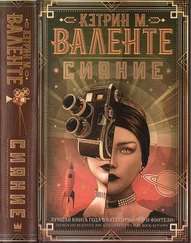“Everyone has vanity,” said Sergeant Tomek. “Everyone here.”
The old man looked up cannily at the strigils. Behind his blinders, his eyes shone. “Do you?”
Detective Belacqua squatted down on his heels. He had a suspicion, and he knew how to work on friars. You had to awe them. Morning picked at the stitches of dark. If there had been any true songbirds in Nowhere, they would have sung. Belacqua fixed his black heron’s eyes on the hooded soul before him. “Do you remember the founding of Florence, Girolamo? That is where you lived, is it not?”
“Don’t be absurd. Florence was old when I was young.”
“Quite so. Yet I do remember the founding of Nowhere. Did you know that? Some of us do, some of us don’t, it’s a funny old thing, like whether or not someone like you remembers losing his baby teeth. A toss of the cognitive dice. But I remember. Lucky me! You see, the plain, the plain is the thing. The mud flat going on and on out there forever. The handful of trees—as few and as far between as living planets in empty space. The old riverbeds. Somewhere out beyond the road and the mountain there’s a black salt flat a light year across. The clouds. The stars. And people didn’t come right away. It wasn’t like you’d imagine—nothing, and then hordes all at once. People just died like dogs or fish or dinosaurs until, I don’t know, what would you say, Tomek? Around the time they started painting ibexes on cave walls?”
The sergeant nodded his dark head.
“Well, my friend, you can just imagine what a mess it all was in the beginning. No system. No rules. Some people could go up the mountain as quick as you like, and some couldn’t, and some could go down into the coal pits, and some couldn’t, and some just milled around like cows down here, and if they tried to go on up, they found themselves turned right back around facing the infinite floodplain with not an inch gained, but no one really had a bead on the whys and wherefores of the whole business. Cosmology just sort of happened to you, on you get. And the people down here in the mud, they just sat there or laid there or stood there for ages, really, proper ages, with nothing to do. That’s the worst thing for a person. To get crushed under the weight of endless useless days. Between you and me, I don’t think anyone really thought it through. I bet you’d rather have a fellow spearing you with a flaming trident every hour on the hour—at least then, something would happen . Am I right? I believe I am. So these poor souls fought and fucked and screamed for awhile, because those’re pretty good ways to stop yourself thinking about the existential chasm of time. But they didn’t bleed and they didn’t come and nobody answered them, so eventually, they started digging in the mud with whatever they’d brought in their bindles, which back then, was mostly stone tools. They pulled up the stones of the moral universe and put them one on top of the other, and I’ll tell you a secret, Giro. For awhile, I think this was a happier place than Heaven, when they were putting down those rocks. But happiness isn’t the point. Not here. If we’d let you keep on with it, your lot would have built city after city, an empire of the dead, and it would look just like the world out here, only filled with legions of the mediocre and the stalled out and the unrepentant and whatever you’re supposed to be. So we got called up, me and the sergeant here and all the other strigils. Hatched out of an egg of ice, I’m told, though that sort of insider talk is above my pay grade. And we came bearing order , Girolamo. We came with rules in our beaks. We built Nowhere together, strigils and humans, the dead and the divine.” Detective Belacqua put one hand on his chest and the other over Savonarola’s withered heart. “ Me and you . A closed system. A city on the hill. And I think it’s beautiful . But you don’t, do you? You hate it, like you hated everything you ever clapped your eyes on. Except her . So here’s what I think, friend. I think you found a way to get her out. God only knows what. But you did it to her and now she’s gone and if you tell me what happened, no one will be angry—we quite literally cannot be angry. Who could blame you? It’s the nature of love, I should imagine.”
Girolamo Savonarola laughed.
“You ought to write a book,” he giggled, but when Sergeant Tomek began to strip his charcoal-blue robes from him, the friar began to sob instead.
ELEVENTH TERRACE: THE SORROWFUL
IT HITS HER while she kisses Awo’s naked shoulder, Awo, whose cell Pietta visits far more than any other, though in recent years she’s visited many. She even found Beatrice, who turned out to be very shy and fond of rain. It is something to do, and Pietta is desperate for acts . Acts have befores and afters. They mark her movement through this air and these stones. She has tried other sins, but they are more difficult in Nowhere. She cannot bring herself to envy anyone, and wants for nothing; she cannot eat and she cannot strive. So there is this, and though she feels it only dimly, she holds on very tight.
Pietta and Awo lie together in the lantern-light of Purgatory and there is a moment when she does not know who she is, not really, and then that moment burns itself out. Pietta remembers the feeling of being Pietta. She remembers being small and she remembers being big. All of the things that ever happened to her stack up in her mind like stones on a sea shore, tottering, tottering… Pietta is getting born in a room with poppies painted on the wall, Pietta is small and delighted and running through the snow, forgetting her mother completely and throwing herself face first into the soft powder, Pietta is receiving her first communion and coughing when she oughtn’t because the incense tickles her nose, and she is helping her father tend his bees in their fields, and she is walking in the woods at night with a boy named Milo, and she is living in a house by the sea with Milo who has grown very distant with her, even though she is pregnant and they should be happy, and Pietta is giving birth to her son in a room with ultramarine flowers next to her bed in a cheap, gold-painted vase, and Pietta is walking in the summer, alone, for once, when she sees a white lizard hiding in the shade of a long, flat stone, and she takes it home and gives it a name and shows it to her son and keeps it in an old fish tank even though Milo says it is stupid and lizards have no hearts and Pietta is wearing her mother’s diamond ring every day even though they could use the money because no amount of snow could make her forget, not really, and Milo is so angry with her so often, every thing she does is the wrong thing, and though she still loves him she grows very still inside, she feels as though she is trapped in ice and cannot move, even as she cooks and cleans and runs to the shops and teaches her classes and she is getting older all the time and then Pietta is teaching her son to play chess with a set made to look like a famous medieval set with funny-looking people in funny-looking chairs, she is cutting out the green felt for his Halloween costume because he insists upon being a tree this year, she is pouring herself the last of the red wine and locking up the liquor cabinet with a brass key, she is putting away her husband’s clothes, his coats, his socks, his old belt, and thinking that she should have bought him a new one long ago, and she will now, she will, because tomorrow will be the day she wakes up out of the ice and becomes herself again, she knows it will happen all at once, like a big silver fruit cracking open, and there she’ll be, good as new, even though she thought the same yesterday, and the day before, and the day before that, and when the glazier’s truck hits Pietta in the high street she thinks, for a moment, that all that beautiful, shattered, colored glass lying around her is the ice breaking at last, the fruit breaking open, with Pietta whole and alive inside, but it is not.
Читать дальше

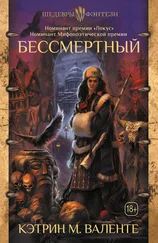
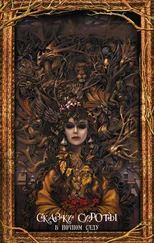
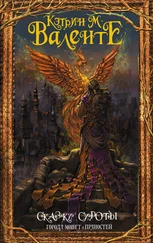
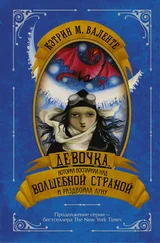
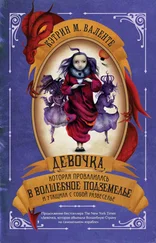
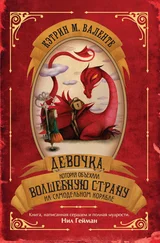
![Кэтрин Валенте - Minecraft - Край [litres]](/books/392702/ketrin-valente-minecraft-kraj-litres-thumb.webp)
![Кэтрин Валенте - Сияние [litres]](/books/401261/ketrin-valente-siyanie-litres-thumb.webp)
